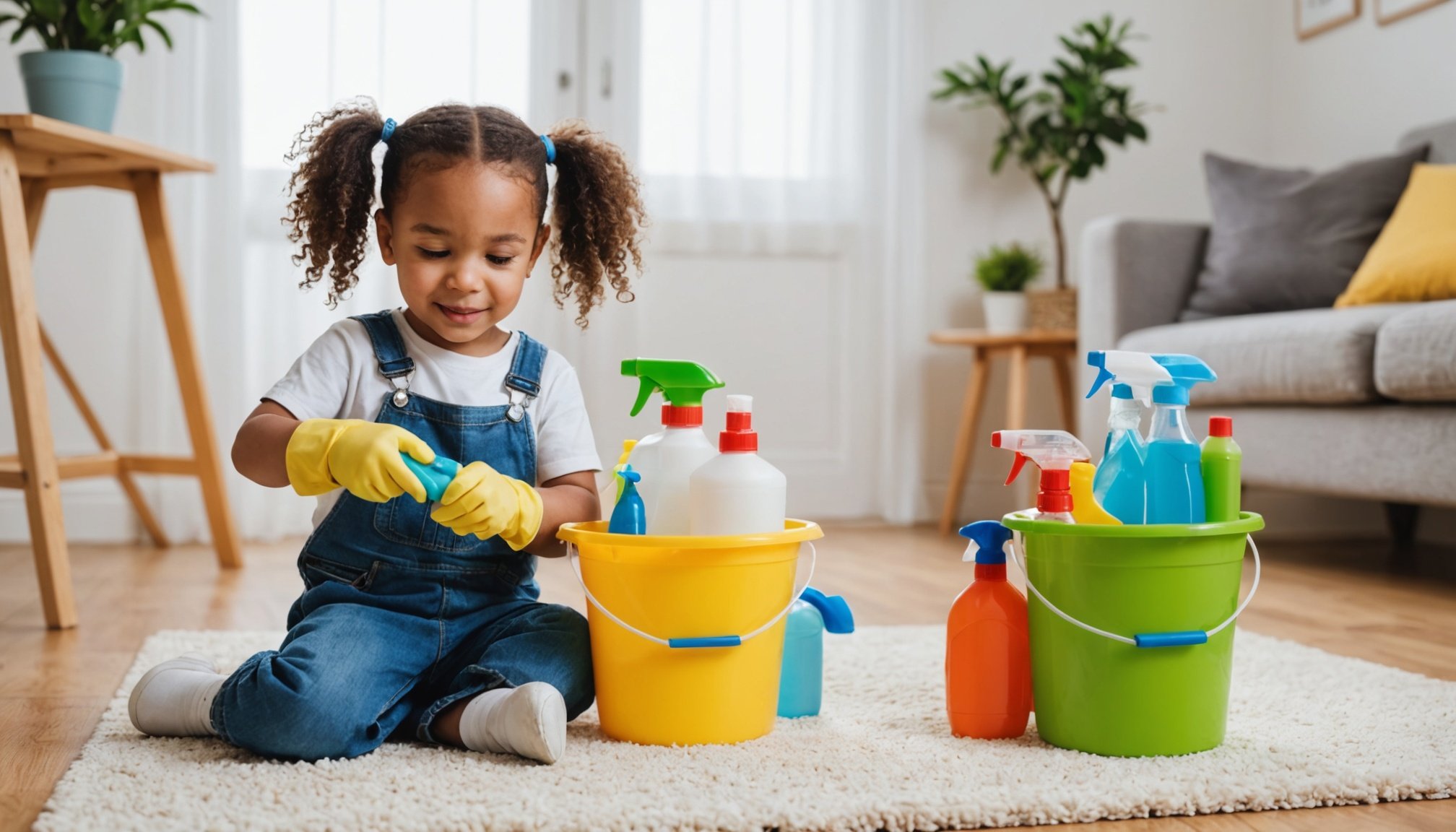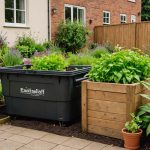Top Non-Toxic Cleaning Solutions for Family Safety
Finding the right cleaning products is crucial, particularly for families. Non-toxic cleaning solutions stand out as they ensure a safer environment without compromising on cleanliness. These safe, family-friendly cleaners are free from harmful chemicals, providing peace of mind to parents who worry about exposure to toxins.
The use of non-toxic products in the home comes with multiple benefits. Firstly, they reduce the risk of allergies and other health issues related to chemical exposure. This is particularly important for households with young children and pets, who are more sensitive to harsh substances. Furthermore, these eco-friendly solutions support sustainable living, as they decrease the release of pollutants into the environment.
In the same genre : Stylish Storage Solutions to Tidy Up Your UK Hallway: Balancing Elegance and Organization
Safety ratings play a significant role in choosing cleaning solutions. A high safety rating indicates rigorously tested formulations that meet stringent standards. These ratings help consumers easily identify products that are genuinely non-toxic, allowing families to make informed decisions.
When looking for non-toxic cleaning solutions, consider options labeled with trusted safety certifications. These products ensure a healthier home and contribute to a cleaner planet. By opting for safe cleaning products, families can maintain a spotless home without sacrificing health and safety.
Also to discover : Unlock Your Imagination: Innovative Uses of Chalk Paint for Stunning Shabby Chic Decor in the UK
Recommended Non-Toxic Cleaning Products in the UK
When it comes to maintaining a clean and healthy home, selecting the best eco-friendly cleaners is crucial. Below are top picks for non-toxic products that are both effective and highly rated by users.
All-Purpose Cleaners
For those seeking versatile solutions, several brands stand out for their commitment to non-toxic formulations. Products like Method All-Purpose and Ecover offer health benefits by using natural ingredients such as plant-based surfactants. Users appreciate their pleasant scents and effectiveness.
- Brands: Method, Ecover
- Benefits: Reduced allergy risks, safer for children and pets
- User Reviews: Notable for cleaning power and fragrance
Floor Cleaners
Floorings, whether wooden or tiled, require specific non-toxic cleaners to maintain their finish. Brands offering a blend of ingredient safety and functionality include Ecover and Attitude.
- Recommended Products: Ecover Floor Soap, Attitude Floor Cleaner
- Ingredient Safety: Free from harsh chemicals
- Tips: Regular use preserves flooring and ensures a safer home environment
Bathroom Cleaners
Choosing eco-friendly bathroom cleaners can significantly reduce exposure to harmful substances. Brands like Ecozone and Bio-D emphasize natural formulations, offering safer choices without compromising cleanliness.
- Eco-Friendly Choices: Ecozone Bathroom Cleaner, Bio-D Toilet Cleaner
- Health Implications: Minimize respiratory issues from harsh chemicals
- Customer Feedback: Effective on soap scum, gentle scent
DIY Non-Toxic Cleaning Alternatives
Creating homemade cleaning solutions at home offers an array of benefits. Popular ingredients for making non-toxic cleaners include vinegar, baking soda, and essential oils. These substances are not only effective but also safe for household use, making them preferable to chemical-heavy store-bought alternatives.
Common Ingredients
- Vinegar: Effective for cutting through grime and disinfecting surfaces.
- Baking soda: Ideal for scrubbing and odour neutralisation.
- Essential oils: Provide pleasant scents and additional cleaning properties.
DIY Cleaner Recipes
To make a basic all-purpose cleaner, combine equal parts vinegar and water in a spray bottle. Add a few drops of essential oil to eliminate the vinegar’s sharp scent. This mixture disinfects kitchen countertops, bathroom surfaces, and more.
For a tougher cleaning task, such as scrubbing tubs or tiles, a baking soda paste works wonders. Mix baking soda with just enough water to form a thick paste, apply it to the surface, scrub, and rinse.
Benefits
DIY cleaners are cost-effective and environmentally friendly. Unlike many commercial products, they do not contribute to indoor pollution, offering peace of mind and a healthy home atmosphere. Making your own cleaning solutions puts you in control of the ingredients, ensuring a safe and toxin-free environment for your family.
Effectiveness of Non-Toxic Solutions Compared to Conventional Products
When evaluating cleaning product effectiveness, consumers often face a choice between non-toxic vs conventional options. This decision hinges on finding a product that balances safety with cleaning efficacy.
Performance Insights
Research shows that non-toxic cleaners can offer impressive cleaning power comparable to conventional products. In various user surveys, consumers report satisfactory results with eco-friendly products, often noting their pleasant scents and lack of harsh residues as additional benefits. However, some experts caution that while non-toxic options are effective under typical conditions, they may require more elbow grease against stubborn grime.
The trade-off primarily lies in the ingredients; non-toxic products generally avoid harsh chemicals, which some experts argue can slightly compromise performance but significantly enhance safety. User satisfaction studies echo these sentiments, revealing a growing trend towards prioritizing health and environmental considerations over maximum stain-blasting power.
Long-term Health Benefits
Cumulative exposure to harmful chemicals often present in traditional cleaning agents can affect respiratory health and skin over time. Switching to non-toxic alternatives may reduce these risks, promoting overall well-being. Testimonials from families who have made this switch cite reduced allergies and skin irritations, corroborating the health benefits associated with non-toxic choices. These personal stories highlight the tangible health outcomes of choosing safer cleaning options for a healthier home environment.
Safe Cleaning Practices for a Healthy Home
Creating a healthy environment at home requires adopting safe cleaning habits. Minimizing risks when using cleaning products is essential. Start by selecting eco-friendly cleaning tips, which reduce exposure to harmful chemicals. Eco-friendly products not only safeguard your family’s health but also protect the environment.
Proper ventilation is crucial during cleaning. Open windows and doors to ensure air circulates, diluting any lingering fumes. Additionally, correctly storing cleaning supplies is vital. Keep products in their original containers, away from children’s reach, ideally in a locked cabinet. This step maintains safety and prevents accidental ingestion or misuse.
For family safety, involve children in safe cleaning routines to teach responsibility while ensuring their protection. Choose age-appropriate tasks, such as dusting with a damp cloth or organizing toys, to introduce them to responsible habits without exposing them to harsh chemicals. Always supervise their activities.
Here are some family-oriented tips that encourage children’s participation safely:
- Use non-toxic products for tasks involving children.
- Ensure they wear protective gloves if necessary.
- Educate them about the importance of cleaning and proper hygiene.
By incorporating these practices, you can enjoy a clean home while prioritizing your family’s well-being.
Introduction to Non-Toxic Cleaning Solutions
In recent years, the shift towards non-toxic cleaning has gained significant momentum. As families become increasingly aware of the health impacts associated with traditional cleaning products, many are turning to safer alternatives. This movement is driven not only by a desire to protect vulnerable family members, such as children, but also to contribute positively to the environment.
Non-toxic cleaning products offer numerous benefits, particularly in creating a safe home environment. Traditional cleaning agents often contain harmful chemicals that can cause skin irritations, respiratory issues, and other health problems, particularly in children who are more sensitive to toxic substances. By switching to these safer alternatives, families can mitigate these risks substantially.
Moreover, the growing preference for eco-friendly cleaning solutions reflects a broader societal trend towards sustainable living. These products are generally free from hazardous substances and are biodegradable, resulting in less pollution and a reduced carbon footprint. As eco-conscious choices become more mainstream, non-toxic cleaning solutions represent an integral part of this innovative shift, promising a healthier home and planet.
Embracing such products underscores a commitment not only to family health but also to preserving our natural surroundings for future generations.
Recommended Non-Toxic Cleaning Products
When it comes to maintaining a clean home, opting for the best non-toxic cleaners is a smart choice for both your health and the environment.
All-Purpose Cleaners
Finding an effective cleaning solution that suits multiple surfaces can streamline your cleaning routine. Among the top non-toxic all-purpose cleaners, look for products featuring ingredients such as vinegar, baking soda, and plant-based surfactants. These ingredients boast natural disinfectant properties while being gentle on sensitive skin. To maximise the effectiveness, consider these tips: ensure surfaces are dust-free before application and allow the cleaner to sit for a few minutes before wiping for intense grime removal.
Bathroom Cleaners
Bathroom areas require specialised attention given their moisture-prone environments. Top-rated bathroom cleaning options often carry safety certifications like EPA’s Safer Choice or Green Seal. These products employ ingredients such as citric acid and essential oils, offering antibacterial actions without harsh chemicals. Alternatively, DIY concoctions using baking soda and lemon juice can serve as safe and efficient alternatives.
Kitchen Cleaners
In the kitchen, food-safe solutions are paramount. Consider cleaners with a minimal ingredient list that excludes phthalates and formaldehyde. Ingredients like soap bark extract and coconut surfactants are effective yet safe for food preparation areas. Remember to clean spills immediately and regularly sanitise high-contact surfaces to maintain optimal kitchen hygiene.
DIY Non-Toxic Cleaning Solutions
Using homemade cleaners not only helps reduce exposure to harmful chemicals but also allows for customisation specific to your needs. Creating your own cleaning products can be more cost-effective and sustainable, as they often use readily available natural ingredients. Additionally, these solutions can be environmentally friendly, reducing waste and harmful chemical runoff.
Essential Ingredients for Effective Homemade Cleaners
Several natural ingredients stand out for their cleaning properties. White vinegar is a popular choice due to its ability to cut through grease and combat odours. Baking soda is well-known for its mild abrasive properties and deodorising ability. Lemon juice provides natural antibacterial properties as well as a refreshing scent. Essential oils like tea tree or lavender can add both fragrance and additional cleaning power.
Simple Recipes for Various Cleaning Needs
- All-Purpose Cleaner: Combine equal parts white vinegar and water in a spray bottle, and add a few drops of your favourite essential oil.
- Glass Cleaner: Mix 2 cups of water, 1/4 cup of vinegar, and 1/2 teaspoon of liquid dish soap.
- Bathroom Scrub: Create a paste using baking soda and water for scrubbing surfaces.
These recipes not only utilise natural ingredients but also ensure that your home is cleaned effectively and safely.
Safety and Eco-Friendliness of Non-Toxic Solutions
When exploring sustainable cleaning options, it’s vital to consider the safety ratings of non-toxic brands. Popular non-toxic brands often undergo rigorous testing, ensuring they meet high safety standards that protect not only the home but also the environment. These products typically avoid harsh chemicals found in traditional cleaners, making them a healthier choice for your home environment.
The benefits of incorporating eco-friendly products into your cleaning routine are multifaceted. Non-toxic alternatives contribute to a healthier home environment by reducing exposure to harmful substances, which can lead to improved air quality and less risk of allergic reactions or respiratory issues. Furthermore, these products also support a more sustainable lifestyle, often coming in biodegradable packaging and from ethically sourced materials.
Comparatively, traditional cleaners can have numerous adverse effects. They often contain volatile organic compounds (VOCs), which can contribute to indoor air pollution and negatively impact respiratory health. In contrast, non-toxic solutions mitigate these risks, providing a safer cleaning experience.
Overall, opting for eco-friendly, non-toxic cleaning products plays a crucial role in fostering a healthier home and contributing to environmental sustainability. Making informed decisions about such products can empower users to maintain cleaner, safer, and more sustainable living spaces.
Reviews and Comparisons of Top Products
Choosing a non-toxic cleaner involves considering both effectiveness and safety for your home environment. Let’s delve into the reviews and comparisons of the top products in this category.
When looking into product reviews, many users applaud non-toxic cleaners for their safe ingredients and effective cleaning power. For instance, products like Branch Basics and Biokleen are often highlighted for their plant-based formulas and absence of harmful chemicals. These reviews suggest a positive reception amongst consumers who prioritize health without compromising cleanliness.
A detailed comparison of these non-toxic options shows varied efficacy across different surfaces and types of stains. For instance, Branch Basics tends to excel in general cleaning tasks, while Mrs. Meyer’s proves more effective on stubborn grease. Reading numerous reviews, it’s clear that while some find these products equal to conventional cleaners, others note a slight trade-off in cleaning power for safety.
Pricing plays a crucial role in these evaluations. Non-toxic cleaners typically range from moderate to slightly higher price points compared to standard cleaning agents. However, the investment is often justified by the health benefits and environmental impact. Buying options include direct-from-manufacturer websites, grocery stores, and online retailers, providing convenient access for consumers.
Tips for Maintaining a Non-Toxic Home Environment
Creating a healthy living space involves adopting simple practices that collectively result in a safer home environment. Families can greatly benefit from a structured approach to cleaning and education on non-toxic products.
Regular Cleaning Routines
Establishing a cleaning schedule that prioritises non-toxic products is essential. Such routine ensures that harmful chemicals are not part of your daily life. Consistent, eco-friendly cleaning not only maintains cleanliness but also minimises exposure to toxins. Adopting safe household tips, like using vinegar and baking soda for most cleaning tasks, contributes significantly to maintaining a non-toxic home. The regular use of these natural alternatives ensures that your surfaces remain free from chemical residues.
Educating Family Members
Involving family, especially children, in non-toxic living is crucial. Kids learn best through interactive activities. Engage them with fun cleaning tasks using safe products. Encourage them to sort recyclable materials. This is an excellent way to teach environmental responsibility. There are abundant online resources available that provide comprehensive information on non-toxic products. Utilizing these can aid in fostering a culture of safe cleaning practices within the household.
Sustainable Practices
Sustainability goes hand in hand with non-toxic environments. Implementing habits like recycling packaging and opting for bulk refill options helps reduce waste. Moreover, spreading awareness about the importance of reducing harmful pollutants can significantly contribute to a safer home.











